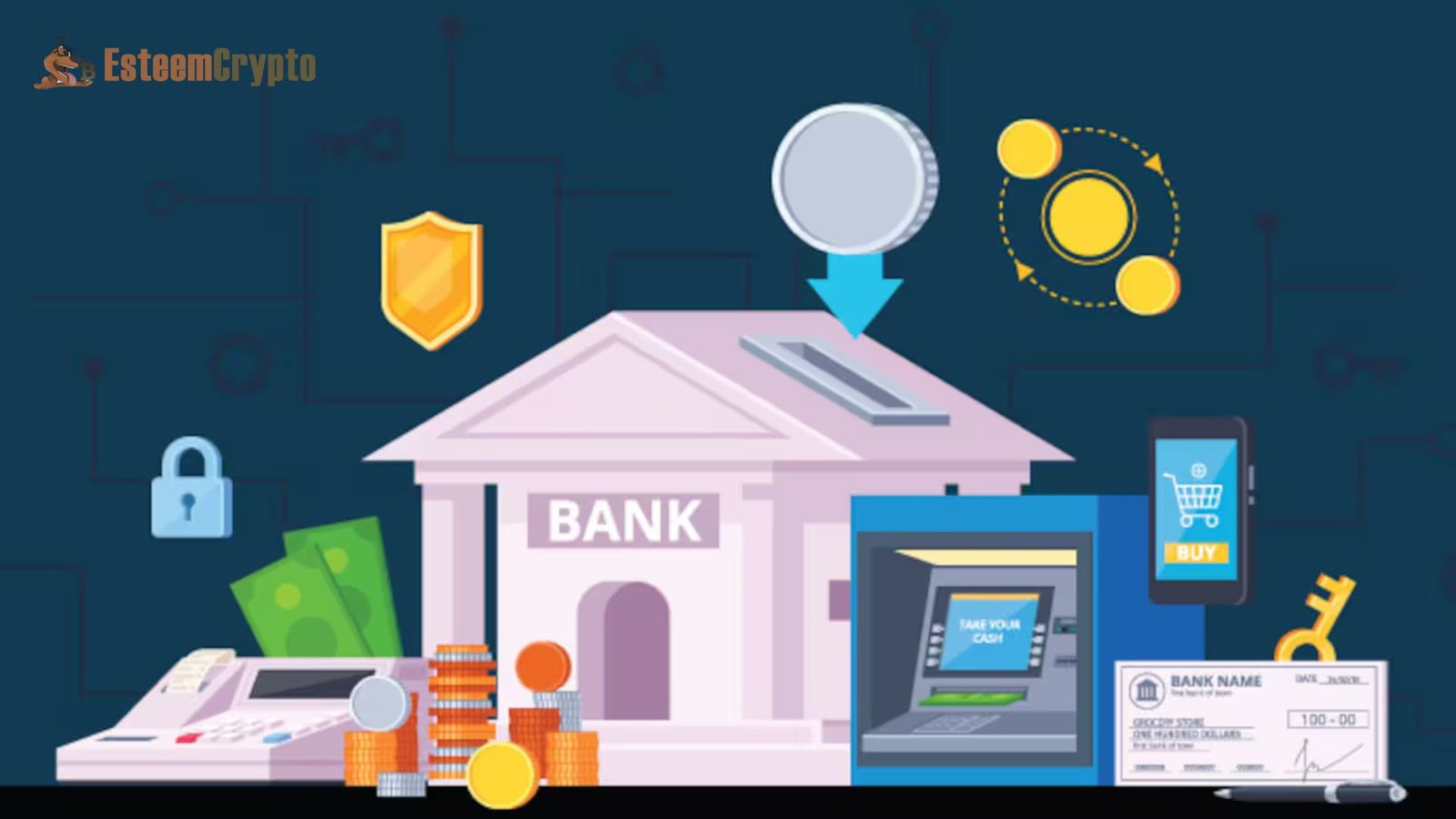Blockchain technology and digital assets are causing a dramatic change in the banking sector. These technologies are revolutionizing the financial services business. This article explores the novel applications of blockchain technology that have the potential to improve banking operations in terms of efficiency, security, and openness. Financial institutions can use blockchain technology to their advantage by learning its basics and how it affects contemporary banking. This knowledge will allow them to develop new business models that withstand today’s stringent regulations.
Understanding Blockchain Technology in Modern Banking
Blockchain technology allows for the secure and unchangeable recording of transactions using a decentralized distributed ledger system. Blockchain functions on a decentralized network that allows users to transact with one another directly, eliminating intermediaries and so lowering the possibility of fraud in financial transactions. There is a nearly impossible-to-change chain of encrypted transactions linked to one another. This groundbreaking groundbreaking groundbreaking process supports financial assets within the banking industry, making it easier to transfer digital assets like stablecoins and bitcoin.
The Role of Blockchain in Modern Banking
Blockchain technology is essential in today’s banking industry to improve safety and efficiency. With blockchain technology enabling real-time settlement of transactions and lowering transaction fees compared to traditional banking, more and more financial institutions are embracing it to enhance cross-border payments. Banks may automate procedures with smart contracts, which improves trade finance efficiency and ensures compliance with regulatory frameworks. Both banks and regulators are interested in blockchain technology, which bodes well for future partnerships and might lead to groundbreaking services that can satisfy the industry’s demanding standards.
Key Features of Blockchain Networks
The banking industry may greatly benefit from the several essential features offered by blockchain networks. Participants may trust one another because distributed ledger technology is immutable, meaning recorded transactions cannot be changed. Also, without sacrificing security, all parties may access transaction histories on blockchain networks, which provides unrivaled transparency. In addition to reaping the benefits of blockchain applications, financial institutions can keep control of their data by creating private blockchains. In the financial services industry, these qualities help speed up operations, make them more secure, and save operational costs.
Use Cases of Blockchain in the Banking Sector
Transforming Transactions with Blockchain Technology
Transactions in the financial sector are being transformed by blockchain technology, which allows for faster and more efficient processes. Delays and additional fees are common outcomes of traditional banking systems’ reliance on intermediaries to manage transactions. Blockchain technology, on the other hand, allows for the settlement of transactions in real-time, which is especially useful for international payments where delays can have a major influence on companies. Banks may improve efficiency and provide better customer service by utilizing this technology. Transactions will be processed quickly and securely, unlike with traditional techniques. Banking on blockchain technology is more than a fad; it heralds a sea change in the financial services industry, opening the door to new, efficient business models.
Improving Security through Blockchain Solutions
Blockchain technologies are confronting the banking industry’s security concerns head-on. Distributed ledger technology drastically lowers the possibility of fraud due to the immutability of recorded transactions. Blockchain technology is on the rise among financial organizations to strengthen their security measures and guarantee the safe storage of critical information—better oversight of transactions and conformity with regulatory standards further benefit blockchain’s openness. With the ever-changing landscape of cyber dangers, blockchain technology is gaining significant attention as a way to enhance banking security. This makes it an essential part of modern financial services.
Integration of Digital Assets in Banking
Central bank digital currencies (CBDCs) and other digital assets are changing banks’ operations. Banks and other financial institutions are investigating digital currencies to adapt to customers’ evolving needs. Financial institutions can improve customer service and introduce new products by diversifying their holdings with digital assets. This integration is further expedited by using smart contracts within blockchain technology, which automate procedures and ensure compliance with regulatory standards. As it changes, financial institutions must work together to adopt digital assets to remain competitive in the dynamic financial services market.
Advantages of Digital Currencies in Banking
Enhancing Transaction Speed and Efficiency
Financial institutions’ use of digital currencies greatly improves the efficiency and speed of financial transactions. Particularly when sending money internationally, the traditional banking system can be slow because of all the intermediaries involved. Nevertheless, financial institutions may streamline processes and improve client happiness by adopting blockchain technology, which enables real-time transactions. Faster transactions than with traditional banking are possible with digital assets such as bitcoin and stablecoins. Therefore, banks that use digital currencies can position themselves competitively in the changing financial services market by offering more efficient services.
Reducing Costs and Fees with Digital Assets
The possibility of fee and expense reductions is one of the most attractive features of digital asset integration within the banking industry. Since there are usually a lot of intermediaries and long procedures involved in traditional banking transactions, the costs can add up quickly. Financial institutions can drastically reduce these expenses through blockchain technology, which allows for more competitive pricing structures. By cutting out intermediaries and digitalizing settlement processes, digital currencies like central bank digital currencies (CBDCs) boost efficiency. As a result of reduced consumer fees, increased financial inclusion is fostered, and banks also profit from this cost-effectiveness.
Addressing Challenges of Legacy Systems
Old, inefficient systems are a common problem in the banking business and a major barrier to innovation and efficiency. Financial institutions can effectively tackle these difficulties by using blockchain technology. To facilitate infrastructure modernization, blockchain provides an immutable and transparent ledger, which improves data integrity and security. Through this move, financial organizations can improve service delivery and streamline compliance with regulatory frameworks. More inventive business models can be realized by integrating blockchain technology into existing systems, speeding up operations, decreasing transaction times, and improving the customer experience overall.
The Future of Banking with Blockchain Technology
Potential Impact on Traditional Banking Models
The advent of blockchain technology can significantly alter the current state of banking by promoting the decentralization of financial services. Blockchain technology allows financial institutions to revolutionize how actions are handled by increasing transparency and security. Due to this upheaval, new financial institutions may arise, competing with established paradigms by doing away with conventional intermediaries. Furthermore, conventional financial institutions must change to accommodate tech-savvy customers’ demands as digital currencies gain traction. To adapt to the ever-changing financial services ecosystem, financial institutions open to change can create new business models that serve a broader customer base.
Read More: Blockchain for Companies: A Business Operations Game Changer
Regulatory Considerations for Digital Assets
The importance of regulatory factors is growing as digital assets are used more frequently in banking. Authorities charged with monitoring compliance and safeguarding consumers face new obstacles due to the proliferation of blockchain technology and cryptocurrencies. Financial institutions must traverse a complicated regulatory framework to use digital assets responsibly. To create standards that encourage innovation without jeopardizing security, regulators and financial institutions must work together. To further reduce risks associated with this revolutionary change, stakeholders are looking to the banking industry for more openness and increased adoption of blockchain technology and digital currencies, which transparent regulatory frameworks can foster.
Innovations on the Horizon for Blockchain in Banking
New developments in blockchain technology have the potential to revolutionize the banking industry. New technologies like tokenizing assets and decentralized financing (DeFi) platforms present interesting opportunities for banks open to change. These advancements have the potential to simplify operations, increase liquidity, and broaden the availability of financial services to disadvantaged communities. Also, smart contract innovations can streamline manual monitoring by automating complicated transactions and guaranteeing compliance. Future breakthroughs in blockchain technology may reshape the banking sector, leading to a more inclusive and efficient financial ecosystem as financial institutions delve deeper into the technology’s capabilities.













